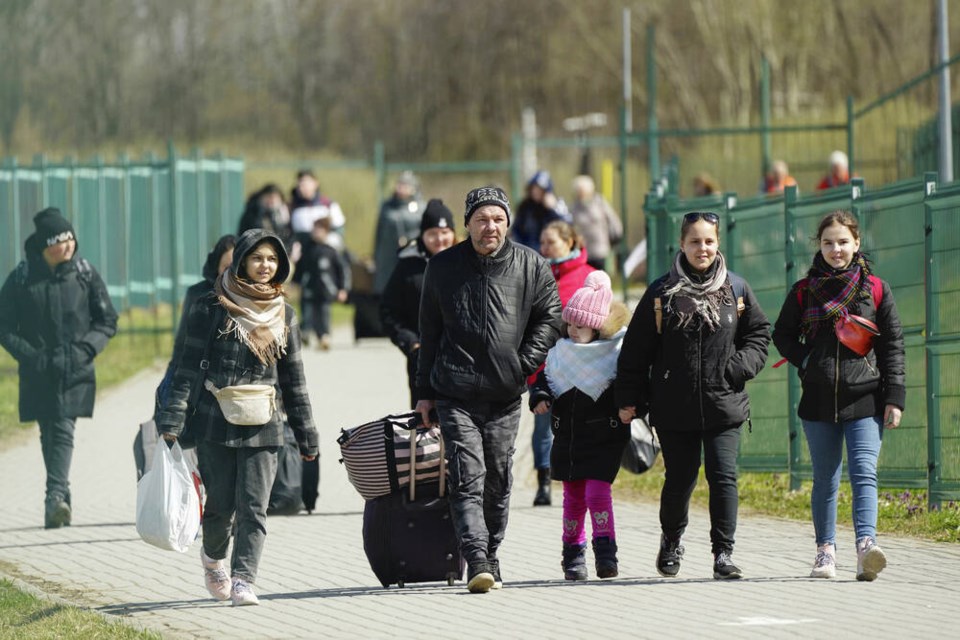The volunteers already working around the clock to ready for Ukrainian newcomers know it. The federal and provincial officials bracing for the work flow know it.
But the full realization of what a massive undertaking it will be to help those fleeing the war in Ukraine is still dawning. Canada is essentially throwing the doors wide open to rescue people from the atrocity Russia has committed.
That means provinces are obliged to step up as well. By the time the full rescue effort is underway, likely every level of government and public agency in the country and all manner of non-governmental organizations will be immersed in helping out.
A Tuesday update on the B.C. effort gives a glimpse of what lies ahead. A “one-time” hike of $15 million over the next two years was announced to help refugees and newcomers to B.C.
The bulk of that new funding — $12 million — is earmarked for the B.C. settlement and integration services program. That represents a doubling of the program’s capacity, Municipal Affairs Minister Nathan Cullen said. The program essentially distributes funding to more than 30 non-profits and community groups that help newcomers.
Provincial budgets always have elasticity and programs often get topped up through the year. But they don’t get doubled very often. And expectations around the numbers of people potentially arriving in B.C. suggest more will be needed.
The rest of the money is being disbursed equally to three other programs: the Refugee Readiness Fund, the settlement agencies and the provincial 211 toll-free support line. The readiness fund was created last year with $2 million in what was then called one-time funding, so it’s being hiked 50 per cent.
An update on how many refugees are expected is imprecise, because the situation is so fluid. But tens of thousands could be arriving in B.C. in successive waves.
An earlier update, one month ago, said Canada had received 91,000 applications for an unprecedented new arrival document created due to the war, the Canada-Ukraine Authorization for Emergency Travel.
The estimate was that 17 to 20 per cent of them would arrive in B.C., which would amount to between 15,470 and 18,200 new arrivals. There are no limits on the number of people from Ukraine who are eligible to apply, and they can settle in any province they choose.
The latest update says that between March 17 and April 26, Canada received more than 180,000 applications from Ukrainians under the new process and 71,000 of them have been approved.
The approval rate is not known, but the program is designed to be as open as possible. The number of people committed to moving to Canada, as opposed to applying to keep the option open, is also not yet known. Federal officials expect 75 per cent to follow through.
The growth rate in the number of applications, now running at about 30,000 a week, suggests those who have arrived in Canada to date (about 17,000) are just the start.
Cullen said many in the first wave have family support here, but subsequent waves will have “more and more Ukrainians with no connections, family or personal.”
Ottawa has amended the program in line with provincial urging, which, Cullen said, is encouraging.
But they are not legally considered refugees under the new arrival program, so there is less support.
Devon Sereda Goldie, president of the Ukrainian Canadian Congress Victoria branch (ukrainehelpvi.ca), said: “This will support Ukrainians so, so much, and will do so much to alleviate the burden that’s currently on our Ukrainian community.”
She said hundreds of volunteers are putting in 12 to 14 hour days meeting the needs of new arrivals.
“We’re incredibly grateful to the settlement agencies for all the incredible work that they’ve already done.”
Katie Crocker, CEO of the Affiliation of Multicultural Societies and Service Agencies, applauded the government for recognizing the expertise of all the agencies in that group. The number of people supported by those groups is expected to double, to 33,000, with the funding increase.
The funding hike is the most significant of a number of recent moves made to help new arrivals with health and education matters.
But housing will be the biggest challenge. Some extraordinary new housing measures will likely be needed in the months ahead.




